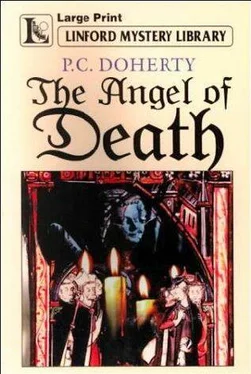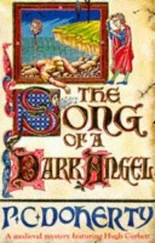Paul Doherty - Angel of Death
Здесь есть возможность читать онлайн «Paul Doherty - Angel of Death» весь текст электронной книги совершенно бесплатно (целиком полную версию без сокращений). В некоторых случаях можно слушать аудио, скачать через торрент в формате fb2 и присутствует краткое содержание. Жанр: Исторический детектив, на английском языке. Описание произведения, (предисловие) а так же отзывы посетителей доступны на портале библиотеки ЛибКат.
- Название:Angel of Death
- Автор:
- Жанр:
- Год:неизвестен
- ISBN:нет данных
- Рейтинг книги:4 / 5. Голосов: 1
-
Избранное:Добавить в избранное
- Отзывы:
-
Ваша оценка:
- 80
- 1
- 2
- 3
- 4
- 5
Angel of Death: краткое содержание, описание и аннотация
Предлагаем к чтению аннотацию, описание, краткое содержание или предисловие (зависит от того, что написал сам автор книги «Angel of Death»). Если вы не нашли необходимую информацию о книге — напишите в комментариях, мы постараемся отыскать её.
Angel of Death — читать онлайн бесплатно полную книгу (весь текст) целиком
Ниже представлен текст книги, разбитый по страницам. Система сохранения места последней прочитанной страницы, позволяет с удобством читать онлайн бесплатно книгу «Angel of Death», без необходимости каждый раз заново искать на чём Вы остановились. Поставьте закладку, и сможете в любой момент перейти на страницу, на которой закончили чтение.
Интервал:
Закладка:
The white plaster walls of the great chapter-house were covered in costly Flemish tapestries and thick Persian carpets had been laid on the polished oaken floor. Candelabra of thick silver, each with a pure wax candle, kept away the darkness. There were braziers full of charcoal on small wheels; fresh herbs had been placed on them before their steel caps were fixed and they were wheeled into the room.
In the far wall a huge fire roared, fed with sea coal and fresh pine logs and at the end of the hall, on a dais under a heavy rafter beam draped with red, white and gold hangings, stood the great table; behind it, carved oaken chairs. The table itself was covered by a white cloth and bedecked with silver and gold ornaments. The canons had evidently raided their treasury, removing all the precious ornaments to grace the hall and so awe the king. Corbett wondered if it was meant as a quiet jest at Edward's expense. He would have heard de Montfort's tirade against royal taxation and then been brought here and feasted at the church's expense, the bishops and canons taunting him with the treasures they so avidly denied him. The king, as if realizing the joke intended for him, did not wait for others to join him from the cathedral, but strode to the head of the hall and took the main seat on the dais. After that it was a frenetic scramble for places, people jostling to be as close as possible to the royal table on the dais. Corbett did not mind. The king had asked him to stay but Corbett whispered it would be better if he dined in the body of the hall and listened to any rumours or whispers which were circulating. The king had nodded. Corbett however realized that Edward, if he was the object of someone's malice, was as vulnerable here as he was in church.
'Your Grace,' he murmured, 'had best be careful what he eats or drinks.'
Surrey, who had placed himself at the king's left hand, turned angrily to Corbett. 'You need not worry, clerk,' he snapped. 'The king will not eat or drink what I have not eaten or drunk first.'
'Then my Lord,' Corbett replied coolly, 'knowing His Grace's life is in your hands and I have your word for it, I feel safe.' He bowed towards the king and withdrew, leaving Surrey, not the most nimble-witted of Edward's courtiers, to wonder if an insult had been given or not.
Corbett chose his place carefully. Already he had suspicions about Plumpton – far too gracious, far too pleasant, almost happy and relieved to see de Montfort dead. A man, Corbett considered, who needed questioning. So when people took their places, he slipped quietly onto the bench beside Plumpton. The canon, apparently pleased by his company, soon engaged him in a detailed conversation about the history of the cathedral whilst carefully avoiding any reference to de Montfort's death. Corbett listened carefully, though wondering where Bassett and Ranulf were. Ranulf, unable to find a seat in the hall, was quick-witted enough to know he would be served better and faster if he went into the kitchens, claiming to be a royal retainer; while Bassett would undoubtedly be carrying out some secret errand of the king. As Plumpton talked, Corbett thought of Bassett, a young man, a knight banneret probably from a landed family. Corbett had met such young men before: they were becoming ever more popular at the court, were totally devoted to the king and seemed to embody that dreadful legal maxim, 'The will of the Prince is force of law.' Bassett was one of these. A ruthlessly ambitious young man for whom there was no morality, no right or wrong, no heaven or hell, no grace no sin, no good no evil, nothing but the will of the prince.
As the king grew older he seemed to surround himself with such men, for Edward could never brook opposition even as a young man, and in his old age found it, however slight, totally intolerable. Corbett had seen Edward fight in Wales. There the king had shown magnanimity to defeated rebels, but now? Corbett looked up the long hall to where the king sat in regal splendour at the high table. Now it was different. Corbett had heard about the expedition to Scotland, the sheer butchery, the king's murderous intent. Men like Surrey who sat beside the king were simply an extension of this royal fury. Surrey was an able soldier, a veteran warrior. He would put a town to the torch as easily as he would cross a street or mount a horse. Sometimes Corbett wondered whether he should serve the king; he had done well with estates in Sussex and was the proud owner of tenements in Suffolk, Shotters Brook, Clerkenwell and Bread Street. He thought of a phrase in the gospel, 'What does it profit a man if he gain the whole world but lose his own soul?' Corbett had to walk gingerly in the intricate politics of the English court, where it would be so easy for a man to lose his way and, eventually, his soul.
The present case was no different. Corbett believed the chalice may have been meant for de Montfort but he had remembered the conversation before mass when Bassett had reminded the king (Corbett had been seated behind him) how, after the priest had taken the chalice as a gesture of friendship, the same cup would be brought for the king to drink. But who would want to kill Edward? Corbett sighed. There must be hundreds. Philip of France,
Edward's sworn enemy, would be only too pleased to see the king die in his cups, or collapse before the high altar in his principal cathedral. Philip would then announce to Christendom how it was God's judgement on a perfidious English king. There were the Welsh chieftains, rebellious and seething with treachery. Corbett had dealt with such; that was how he had met Maeve… her sweet diamond-shaped face framed by long silver-blonde hair flickered into his mind. Corbett closed his eyes and removed the vision. If he started thinking about Maeve nothing would be done. Finally, of course, there were the Scots. Corbett had met their chieftains, Bruce and others, ruthless men totally determined not to give one inch of Scottish soil to England.
Maeve's smiling face returned, so Corbett asserted himself by gazing round the hall. The meal was being served; the Bishop of London's cooks, despite the season, had done their best to provide a banquet. Baked mallard, teal, small birds served in almond milk, capon roasted in syrup, roasted veal, roasted pig, herons, tartar flesh, jellies, broiled rabbit, pheasant, venison, even hedgehogs skinned and baked in a rich sauce, cranes, partridges, custards, oranges, sweet doucettes all served up by a myriad of retainers. They were equally generous in filling the pewter cups from flagons of rich red wine. Corbett, despite his long fast, did not feel hungry. He still remembered de Montfort's face, the blackened mouth and swollen tongue. Moreover, in the far corner of the hall he had just seen a cat carrying the half-gnawed body of a rat and this, together with some of the gaping ulcers on the arms and hands of several of the serving boys, had decidedly put him off his meal. So he sipped quietly at the wine, vowing that as soon as the banquet was over, he would make his way into the city to justify his own hunger.
Plumpton was still talking and Corbett let him babble on as he carefully examined his wooden platter or roundel, tracing with his finger certain verses of the Bible inscribed on it in gilt lettering. This was indeed wealth. The canons of St Paul's may not have known much of poverty but they certainly did about wealth. Even in a nobleman's house the roundel or trancher would have held stale bread, but here it was different. Even the cups given to them were of pewter. Their meals had been served on silver and gold dishes; the candles on the table were pure wax; the drapes on the wall were thick and heavily encrusted with gold. No stone floor, but polished wood covered with carpets. Charcoal braziers, the black metal polished clean, glowed red, giving off not only heat but a sweet fragrance. Plumpton, beside him, sat dressed in a thick robe and cowl lined with white ermine, his fleshy hands covered in rings. Corbett almost recoiled at the womanish perfume the man emanated. The priest seemed oblivious to this as he described the workings of the cathedral until Corbett, tired, decided to interrupt.
Читать дальшеИнтервал:
Закладка:
Похожие книги на «Angel of Death»
Представляем Вашему вниманию похожие книги на «Angel of Death» списком для выбора. Мы отобрали схожую по названию и смыслу литературу в надежде предоставить читателям больше вариантов отыскать новые, интересные, ещё непрочитанные произведения.
Обсуждение, отзывы о книге «Angel of Death» и просто собственные мнения читателей. Оставьте ваши комментарии, напишите, что Вы думаете о произведении, его смысле или главных героях. Укажите что конкретно понравилось, а что нет, и почему Вы так считаете.












